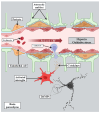Vascular Cognitive Impairment-The Molecular Basis and Potential Influence of the Gut Microbiota on the Pathological Process
- PMID: 39682711
- PMCID: PMC11639845
- DOI: 10.3390/cells13231962
Vascular Cognitive Impairment-The Molecular Basis and Potential Influence of the Gut Microbiota on the Pathological Process
Abstract
Cognitive impairment is a major healthcare challenge worldwide, with vascular cognitive impairment (VCI) being its second leading cause after Alzheimer's disease. VCI is a heterogeneous group of cognitive disorders resulting from various vascular pathologies. Therefore, it is particularly difficult to determine its underlying cause and exact molecular basis. Nevertheless, the current understanding of the pathophysiological processes underlying VCI has changed and evolved in the last decades. The aim of this narrative review is to summarize the current state of knowledge on VCI pathogenesis and to analyze the potential role of the gut microbiota in this process, considering the most recent scientific reports and in accordance with the current understanding of these processes. Chronic cerebral hypoperfusion, which results in impaired blood supply, i.e., oxygen and nutrient deficiency, is the main underlying mechanism of VCI. Furthermore, chronic cerebral hypoperfusion triggers a cascade of molecular changes, starting with an energy imbalance, leading to glutamate excitotoxicity, acidotoxicity, and oxidative stress. Also, all of the above provoke the activation of microglia and the release of pro-inflammatory cytokines that recruit systemic immune cells and lead to their infiltration into the central nervous system, resulting in neuroinflammation. Blood-brain barrier dysfunction may occur at various stages of chronic cerebral hypoperfusion, ultimately increasing its permeability and allowing potentially toxic substances to enter the brain parenchyma. Gut microbiota and their metabolites, which have been identified in numerous inflammatory conditions, may also influence the pathophysiological processes of VCI.
Keywords: gut microbiota; molecular mechanism; vascular cognitive impairment; vascular dementia.
Conflict of interest statement
The authors declare no conflicts of interest.
Figures



Similar articles
-
Pathophysiology of blood brain barrier dysfunction during chronic cerebral hypoperfusion in vascular cognitive impairment.Theranostics. 2022 Jan 16;12(4):1639-1658. doi: 10.7150/thno.68304. eCollection 2022. Theranostics. 2022. PMID: 35198062 Free PMC article. Review.
-
Vascular Cognitive Impairment: Information from Animal Models on the Pathogenic Mechanisms of Cognitive Deficits.Int J Mol Sci. 2019 May 15;20(10):2405. doi: 10.3390/ijms20102405. Int J Mol Sci. 2019. PMID: 31096580 Free PMC article. Review.
-
Lipocalin 2 Facilitates the Initial Compromise of the Blood-Brain Barrier Integrity in Chronic Cerebral Hypoperfusion.CNS Neurosci Ther. 2025 May;31(5):e70438. doi: 10.1111/cns.70438. CNS Neurosci Ther. 2025. PMID: 40365739 Free PMC article.
-
β-hydroxybutyrate improves cognitive impairment caused by chronic cerebral hypoperfusion via amelioration of neuroinflammation and blood-brain barrier damage.Brain Res Bull. 2023 Feb;193:117-130. doi: 10.1016/j.brainresbull.2022.12.011. Epub 2022 Dec 26. Brain Res Bull. 2023. PMID: 36577190
-
Pericyte Dysfunction Contributes to Vascular Cognitive Impairment Induced by Chronic Cerebral Hypoperfusion in Rats.Aging Dis. 2024 May 7;15(3):1357-1372. doi: 10.14336/AD.2023.0821-1. Aging Dis. 2024. PMID: 37611900 Free PMC article.
Cited by
-
The Potential Role of Microbiota in Age-Related Cognitive Decline: A Narrative Review of the Underlying Molecular Mechanisms.Int J Mol Sci. 2025 Feb 13;26(4):1590. doi: 10.3390/ijms26041590. Int J Mol Sci. 2025. PMID: 40004055 Free PMC article. Review.
-
Gut-brain axis and vascular dementia: a review on mechanisms and Chinese herbal medicine therapeutics.Front Microbiol. 2025 May 14;16:1564928. doi: 10.3389/fmicb.2025.1564928. eCollection 2025. Front Microbiol. 2025. PMID: 40438206 Free PMC article. Review.
-
Plasma inflammatory cytokines are associated with cognitive impairment after acute minor ischemic stroke and transient ischemic attack.Front Immunol. 2025 Aug 1;16:1445938. doi: 10.3389/fimmu.2025.1445938. eCollection 2025. Front Immunol. 2025. PMID: 40821836 Free PMC article.
References
-
- Nichols E., Steinmetz J.D., Vollset S.E., Fukutaki K., Chalek J., Abd-Allah F., Abdoli A., Abualhasan A., Abu-Gharbieh E., Akram T.T., et al. Estimation of the Global Prevalence of Dementia in 2019 and Forecasted Prevalence in 2050: An Analysis for the Global Burden of Disease Study 2019. Lancet Public Health. 2022;7:e105–e125. doi: 10.1016/S2468-2667(21)00249-8. - DOI - PMC - PubMed
Publication types
MeSH terms
LinkOut - more resources
Full Text Sources

